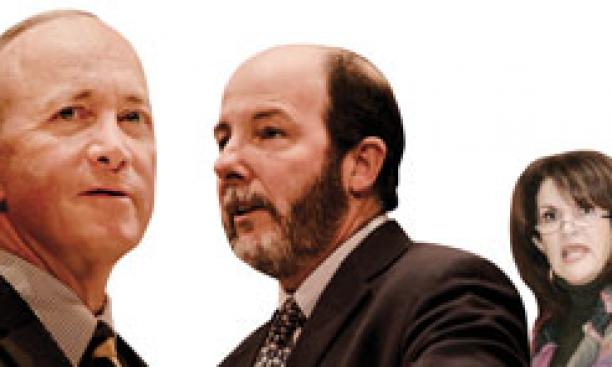
More than 1,100 alumni and family members attended Alumni Day Feb. 23. The University’s highest alumni awards were presented at the annual luncheon in Jadwin Gym to Mitch Daniels ’71, former governor of Indiana and the new president of Purdue University; and Arminio Fraga *85, a financier and former president of the central bank of Brazil. Also recognized were the winners of the Jacobus Fellowships and the Pyne Honor Prize, the University’s top student awards. The day’s activities included faculty lectures on topics that ranged from online learning to the search for life beyond Earth. The University Chapel was nearly filled for the Service of Remembrance, a tribute to alumni, faculty, staff, and students who died in the past year.

Mitch Daniels ’71, former governor of Indiana and the new president of Purdue University, received the Woodrow Wilson Award: “It was very meaningful for me [to receive the Wilson Award] in this particular year for two reasons: It happens as I am entering a world I never expected to — that is, higher education — but also that it happened in the year that Shirley Tilghman is passing off the scene at Princeton after a dozen spectacularly successful years at Princeton. ... I’ve already ordered one of those little rubber bracelets, you know, WWSD — What Would Shirley Do.”
Arminio Fraga *85, a financier and former president of the central bank of Brazil, received the James Madison Medal: “I believe deeply that those who have had the luck as I have — of having a chance to go into public service — should. I really believe this is not a choice; it’s an obligation. ... All of it, I feel, was in a way a continuation of some of the dreams I had when I was here as a graduate student.”
Mitchell Duneier, sociology professor, on “Princeton’s Online Learning Experiment: A Conversation on Coursera:” “We are working with the McGraw Center on how to modernize teaching. It can’t be the case that the way you guys learned in this room however many years ago is going to be that way forever.”
Christopher Chyba, professor of astrophysical sciences and international affairs, on “The Scientific Search for Life Beyond Earth:” “Sometimes you hear people say we have looked and looked and looked [for extraterrestrial life] and we haven’t found anything, so we must be terribly alone. And my reaction to that is we’ve hardly looked at all. ... On the search for intelligent life, we’ve done very little empirically.”
Marta Tienda, sociology professor, on “Is Demography Destiny? U.S. Diversification and Its Discontents:” “We don’t have to go to China to bring in students to educate at Princeton University ... We have enough people here to educate. And this should be our goal.”
Caroline Hanamirian ’13, co-recipient of the Pyne Honor Prize: “Every morning I wake up and my job is to listen — to listen to the smartest people in the world talk about the world. I am definitely going to miss that job.”
Jake Nebel ’13, co-recipient of the Pyne Honor Prize: “Because my concentration is in ethics, I can’t help but recognize that today, Caroline and I were each awarded the equivalent of a yearly income for 20 percent of U.S. households. That’s nearly three times the yearly income of the average person on Earth. If there is any greater evidence for the principle that luck generates an obligation to help the unlucky, I haven’t seen it.”
